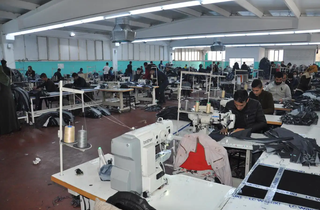The seasonally adjusted unemployment rate for the first quarter of 2024 dipped to 8.7%, marking a slight decrease of 0.1 percentage points compared to the previous quarter. This positive trend is further bolstered by a significant rise in employment and labor force participation.
The report highlights a substantial increase in the number of employed individuals. The seasonally adjusted employment rate reached 49.3%, representing a jump of 0.7 percentage points. This translates to an additional 534,000 people finding employment in the first quarter. This positive development suggests a growing Turkish economy with increased job creation across various sectors.
The data also reveals a rise in labor force participation, reaching 54.1%, an increase of 0.8 percentage points. This indicates a growing willingness among the population to seek employment, reflecting potential confidence in the job market. The participation rate disparity between men (71.7%) and women (36.7%) remains a point of focus, suggesting a need for further initiatives to encourage female participation in the workforce.
There's also positive news for young people entering the workforce. The youth unemployment rate (15-24 age group) showed a welcome decline, falling to 15.6%, a decrease of 0.5 percentage points. This improvement suggests a more promising job market for young graduates and fresh job seekers. However, the gender gap persists here as well, with a youth unemployment rate of 12.8% for young men compared to 20.9% for young women.
The report delves into employment by sector, revealing that the services sector continues to be the driving force, absorbing 58.0% of seasonally adjusted employment. This highlights the growing importance of service industries in the Turkish economy. While the services sector dominates, there were also increases in employment within agriculture, industry, and construction, indicating a more diversified job market.
The data shows a slight decrease in average weekly working hours, with the seasonally and calendar adjusted figure settling at 43.5 hours compared to the previous quarter. This suggests a potential shift in work patterns or a rise in part-time employment.
While the headline unemployment rate shows improvement, the report also highlights a rise in the composite measure of labor underutilization rate to 25.0%. This indicates an increase in underemployment and potential labor force, suggesting there's still room for improvement in creating quality employment opportunities that fully utilize the available workforce.
In conclusion, the latest TURKSTAT data offers a cautiously optimistic outlook for the Turkish labor market. The decrease in unemployment, coupled with a rise in employment and labor force participation, suggests positive momentum. However, the underutilization rate and the gender gap in both employment and unemployment highlight areas that require continued focus and targeted policies to ensure a more inclusive and robust labor market for all. (ILKHA)



 Dünya
Dünya
 Dünya
Dünya
 Güncel
Güncel
 Güncel
Güncel
 Dünya
Dünya
 Dünya
Dünya
 Eğitim
Eğitim
 Dünya
Dünya
 Güncel
Güncel
 Güncel
Güncel





